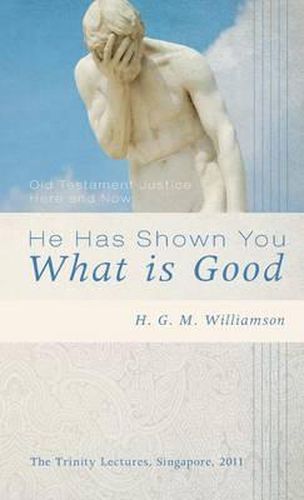Readings Newsletter
Become a Readings Member to make your shopping experience even easier.
Sign in or sign up for free!
You’re not far away from qualifying for FREE standard shipping within Australia
You’ve qualified for FREE standard shipping within Australia
The cart is loading…






Can the Old Testament provide relevant principles for modern concepts of social justice? Today, citing our human rights is used as justification for anything and everything; excessive use has corrupted a defining ideal of humankind. Williamson explores the meaning of Old Testament justice to discover its significance for us today. Concentrating on social justice, he unearths the value and relevance of the phrase justice and righteousness. Tracing this phrase and its context within and without the pages of Scripture, Williamson elaborates an argument that passes from Abraham to Amos. He expounds a biblical ideal that he argues is not rooted in the legalistic Law of Moses, or necessarily an idealized history, but is a concept that is fluid, constructed in an organic appreciation for natural law. Williamson has written an engaging and highly articulate book that exposes the relevance of the Old Testament as a corrective for corrupted human rights; a mode of living that developed in accordance with the existence of the ancient Israelite. The ideal maintained a form, as derived from natural law, that was applicable to all creeds and ranks, and therefore is potentially relevant for us today.
$9.00 standard shipping within Australia
FREE standard shipping within Australia for orders over $100.00
Express & International shipping calculated at checkout
Can the Old Testament provide relevant principles for modern concepts of social justice? Today, citing our human rights is used as justification for anything and everything; excessive use has corrupted a defining ideal of humankind. Williamson explores the meaning of Old Testament justice to discover its significance for us today. Concentrating on social justice, he unearths the value and relevance of the phrase justice and righteousness. Tracing this phrase and its context within and without the pages of Scripture, Williamson elaborates an argument that passes from Abraham to Amos. He expounds a biblical ideal that he argues is not rooted in the legalistic Law of Moses, or necessarily an idealized history, but is a concept that is fluid, constructed in an organic appreciation for natural law. Williamson has written an engaging and highly articulate book that exposes the relevance of the Old Testament as a corrective for corrupted human rights; a mode of living that developed in accordance with the existence of the ancient Israelite. The ideal maintained a form, as derived from natural law, that was applicable to all creeds and ranks, and therefore is potentially relevant for us today.